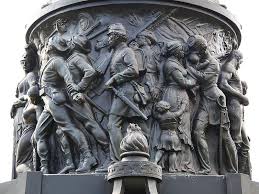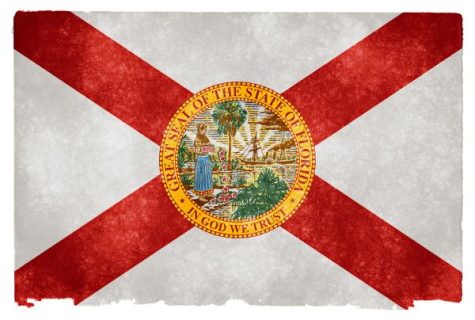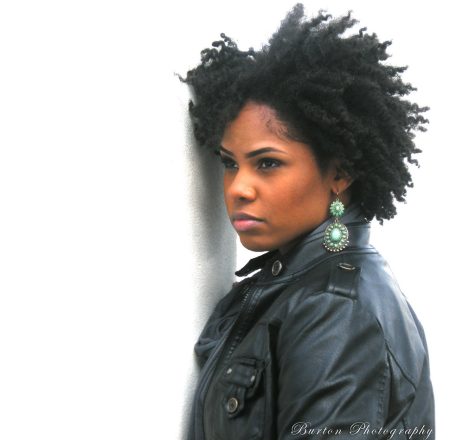Confederate symbols cloud public spaces

Confederate monument in Arlington, Virginia
Over 150 years after the end of the Civil War, our nation is still feeling the ramifications. While every U.S. state is now a free state, there are reminders all over the country of when they were not. Confederate street names and monuments around the country are constant reminders of the nation’s history of slavery and violence. The Confederate statues and streets and the racist America they stand for have been the subject of many protests in recent months.
Notable events like the August killing of counter-protester Heather Heyer after a protester ran her over with his car during a demonstration opposing the removal of a statue of Confederate Gen. Robert E. Lee in Charlottesville, VA have been in the news because of how controversial topics like this can lead to such brutality.
These incidents have sparked varied reactions, from late night talk show host Stephen Colbert saying that, “It is difficult to express how heartbreaking it is to see something like this happening in our country,” to President Donald Trump saying that there was, “hatred, bigotry and violence on many sides.” No matter what people in power say, Confederate symbols now stand for white nationalism and racism and should be removed from public spaces.
North American history, sadly, is rooted in racial discrimination. In 1857, the Dred Scott case was taken to the Supreme Court. This case ruled that slave owners could take their slaves into the newly formed Western territories. This was relatively the beginning of the country’s racial bias. According to the History Network, the goal of the Confederacy was, “to preserve slavery, states’ rights, and political liberty for whites.” The prejudiced history of the United States should be remembered but never celebrated.
A large part of the problem is not only why these statues were created, but when. The Civil War officially ended on May 9, 1865. Despite this, the majority of Confederate monuments were erected between 1900 and the 1920s, according to the Southern Poverty Law Center. Through the early to mid 1900s, racial segregation was at an all time high. Right after the end of the Civil War and through this time, the KKK was formed and rose to power. At the same time as the lynching of innocent African-Americans and the burning of crosses, more Confederate monuments began to show up around the country, even in Union states. These statues were made with the goal of continual terrorization of African-Americans in the U.S.
Citizens who oppose the removal of these monuments express fears of erasing history, while others say our nation as a whole should not be celebrating the heinous events of the Civil War. So where do we draw the line? Removing Confederate statues does not erase history in the slightest. For the purposes of education, people read books and visit museums. These resources are used for knowledge. However, statues are used to celebrate people and events. Confederate statues were put up to preserve the ideals of white supremacy.
One instance of controversy affecting locals is the proposed removal of a statue of former Florida governor Napoleon Bonaparte Broward in a Broward courthouse. Bonaparte, according to The Sun-Sentinel, drafted a document during his term in office that requested Congress “to purchase territory, either domestic or foreign, and provide means to purchase the property of the negroes at a reasonable price and to transport them to the territory purchased by the United States.”
Broward County public defender Howard Finkelstein told Local 10 News that African-American residents make up from 15 to 17 percent of Florida’s population, according to Suburban Statistics and Politifact. He explained how these monuments might affect such a significant group.
“For African-Americans to walk by a statue of a man who didn’t think they should live in this country on their way to a criminal courtroom is the wrong message indeed,” Finkelstein said to Local 10 News.
Confederacy aftermath also pervades local reaction in the renaming of Hollywood streets that are currently named after Confederate soldiers. Recently, the Hollywood City Commission voted 5-1 to rename at least three streets in the suburb, according to NBC Miami. However, this has also been a divided conversation. An African-American citizen of Hollywood named Benjamin Israel said to NBC Miami that the community must, “Think of the inconvenience of the Civil War. Over 600,000 were killed. This [the renaming of the streets] will help make a better America.”
On the other hand, a group called “Save our Streets” was formed to try to prevent the renaming of the streets. John Jacobs of this group said to NBC Miami, “These were not treasonous men. They were 19th century men and shouldn’t be judged by 21st century standards.”
North America cannot be plagued by its racist past. Removing these monuments and renaming streets is just a small step in a direction away from this. Celebrating Confederate soldiers sends the message that South Florida honors discrimination. Although this country and its people cannot escape or change their past, they can move forward and make sure that history doesn’t repeat itself.








